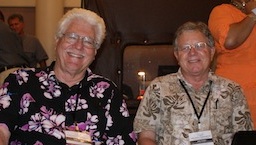 For twenty-six years scientists from around the world have provided advice and support to countries and territories in the South Pacific Region through STAR, the Science, Technology and Resources Network.
For twenty-six years scientists from around the world have provided advice and support to countries and territories in the South Pacific Region through STAR, the Science, Technology and Resources Network.
The most recent meeting, an integral part of the SPC/SOPAC Division meeting, took place in Nadi last week (16th – 21st October).
STAR Chair Dr John Collen, Associate Professor, School of Geography, Environmental and Earth Sciences, Victoria University, Wellington NZ, said that STAR was founded in 1983 in collaboration with the International Oceanographic Commission, so that the international scientific community could provide advice to SOPAC.
Initially STAR was concerned with deep-sea geoscience (or earth science) tectonics (the forces causing movement in the earth’s crust) and resources (oil and minerals).
Dr Gary Greene, Professor Emeritus Marine Geology, Moss Landing Marine Laboratories in California, Chair of the SOPAC Programme Monitoring and Evaluation Group, and Chair of the Technical Advisory Group that is made up of people attending the STAR meeting, agreed that the first days of STAR were a dynamic time.
“In the early days it was really active. It was a time when a lot of countries and universities were bringing ships to undertake research work in the region. It was like a flotilla coming in. And then STAR was the body to report back the results of these cruises,’ said Dr Greene.
“The countries were adamant that they should be involved. And the nice thing about those times, we would make a port of call, and when we did that we would give presentations. In fact, we have pictures of when we went to see the King of Tonga. We went into the palace and sat down with him and explained what we were doing.”
By the 1990’s, when Dr Collen began attending STAR meetings, “Things were already changing, moving away from big ships and deep water science, and with SOPAC evolving into more land-based geology.”
Dr Collen, who took over as Chair of STAR in 1999, said that he has seen SOPAC’s scope expand to cover other technical areas in response to the changing needs and priorities of the Pacific Island countries and territories.
This has resulted in a corresponding expansion of STAR’s scope to cover technical fields relating to SOPAC’s Work Programme and its Strategic Plan.
There has been a huge emphasis on IT, the development of a computing network throughout the Island countries, water and sanitation issues; a lot of it was because of the need and SOPAC was the only organisation with the capacity or ability to do it,” said Dr Collen.
“One thing that has not changed is the significant input STAR makes through Working Groups that meet in the evenings during the meeting, which ensures that a relevant and working relationship is maintained between SOPAC and the scientific community.”
Dr Collen is pleased that, ”given its history,” STAR’s contribution to the South Pacific region looks set to continue, with the next meeting taking place in a year’s time in Noumea with a broader scientific focus to include other fields of study.
“There is a real desire on the part of scientists, that has been present from the time STAR was set up, to help and contribute over and above what they are paid to do in their regular work’” concluded Dr Collen.
Photo Caption: Dr. Gary Greene & Dr John Collen





